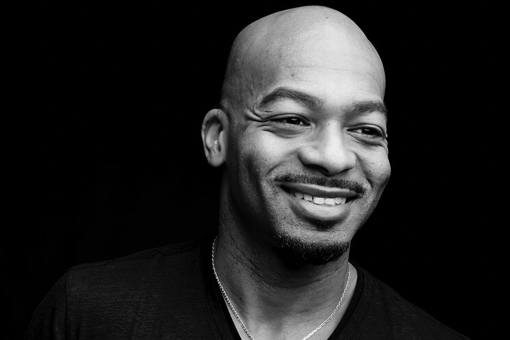“You remember this song?” Brandon Victor Dixon asks, as his fingers glide across the piano. The opening notes of “If I Ain’t Got You” begin to play. He slightly turns to his co-star, Maleah Joi Moon, his defiant daughter. She’s on a rebellious streak and her mother has asked her father to step in and intervene. “Well I wrote it for you when you were a little girl,” he emphasizes. “You used to love it. And I used to love singing it to you. And I still will.”
Their duet is a moment of connection between estranged characters and an emotional crescendo in the Broadway musical Hell’s Kitchen, the jukebox musical created, scored and produced by Alicia Keys. Dixon plays a character based on Keys’ father. Although he didn’t meet Keys’ real-life father till after the first show, he says the words on the page were enough to build the character from scratch.
The two-time Tony Award nominee, who does a jazzy rendition of Keys’ “Fallin’”, has been constructing noteworthy characters for some time now. He played back-stabbing apostle Judas in Jesus Christ Superstar, Harpo in Broadway’s adaptation of The Color Purple, and Berry Gordy, Jr. in Motown the Musical.
In between his weekly 8-show workload, Dixon talked to LEVEL about taking on the role, singing Keys’ most famous song and what his Broadway superpower is.
LEVEL: What is it like playing the role of Davis, which is based on Alicia Keys’ father? Is it harder to play a real person over a fictionalized character?
BRANDON VICTOR DIXON: Playing a real life person can present its challenges. It's more difficult if you're playing a person who is around and in close proximity to the project. Particularly if they're writing, directing or producing a project, that is more challenging. In this role, I had no contact with her father. Whatever they did with respect to her father was put into the script. When it came time to do the production, I started asking questions about her father. And they said, “Don't worry about it.” They're basing the role on the things that I'm doing and the things that I'm creating in the room. So it really had no direct attachment outside of what they put into the script.
What did Alicia’s parents say after seeing your performance?
Oh, her mother loves the show. Her mother's there almost, like, every other day. She’s seen the show and has been with all the readings and workshops throughout. The first time I met her father was at the Tony Awards because he was there with the family. He just came up to me and introduced himself and said, “You know, you’re me!”
The show reimagines Alicia’s discography and your character performs “Fallin’”. How do you feel performing arguably her signature song?
I didn't think too much about it, to be honest with you. You know, once we step into a rehearsal room, you're just working on the scripts and the storytelling and the music from that standpoint.If you're gonna step in to do a show with Alicia Keys all of the music's going to be iconic in one way, shape, or form. What was interesting was hearing Alicia's ideas for how she wanted to approach the song differently.
You perform eight times a week. Do you have any rituals before the show to get prepared physically or mentally?
I’ll work out with my trainer or run a few miles. I find that running or going to the gym definitely helps me in strength and coordination, and helps me with the physicality of the show. And I’ll do a meditation before the show.
What are you listening to during your workout?
A lot of times I'm not listening to anything at all. If I’m running outside, I'm normally not listening to anything.
Where do you run?
If I’m not running around Central Park closer to where I live, then I'm running around Midtown. I'm running through 10th Avenue. Actually Hell’s Kitchen. If you see a guy in a hat, some sunglasses and some really short shorts just running past you…
Why the short shorts? For aerodynamics or fashion?
Absolutely. All runners know. Short shorts. Plus it's hot out here. I have been catcalled.
Something I’ve always wondered, you have so many lines to remember doing live theater. What do you do when you forget them?
When I'm on stage, if I ever forget a line, generally, I'll just paraphrase. Hopefully, I don't paraphrase anything too stupid. And sometimes you can't find anything to say. In the theater, they call it “finding yourself in the white room.” Everything blanked out. But for the most part, you just keep saying something.
Are there go-to filler words? Like, just throw in a” baby” or “hmmm” that could fit into this scene?
Oh, hmmms are good. If you can buy time, buy time. Generally, if somebody forgets a line, the costar knows it immediately, and we'll try and feed you the line. Normally, you get to work together on it.
It’s incredibly competitive to become a Broadway actor. Did you ever have a contingency plan if this didn’t work out?
I didn't. I would always say that, “Plan B needs to be to have the best Plan A possible”. And if you're making a Plan B, then that means you don't think Plan A is going to succeed. But in pursuit of my plan, I was diversifying my toolbox. And I was putting myself in different environments so that I had a mix of tools and I had a mix of networks.
So given that, what’s your superpower?
What is my superpower? I keep going. My superpower is not relentless faith and positivity. It's not always being great. [My superpower is] my willingness to keep going.
